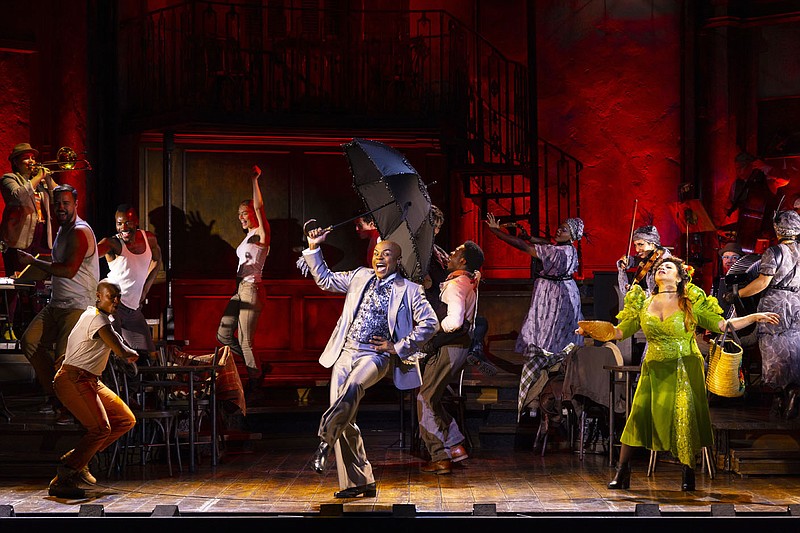The narrator of "Hadestown" closed the opening night of the award-winning musical by acknowledging the elephant in the room.
During an extended standing ovation, Nathan Lee Graham raised a cup to "Fayetteville's queer and trans community." Wearing rainbow-colored feathers symbolic of Hermes' wings, Graham told the audience that if the cast had learned anything from "Hadestown," it is that change is possible and that "in dark times, spring will come again."
The line is a reference to Persephone, the goddess of spring, who changes the seasons to spring and summer when she's "Livin' It Up On Top." When she returns to Hades for the other half of the year, darkness returns to Earth.
"Hadestown" uses this theme in the lighting schemes, which bear the hallmarks of its DIY-theater beginnings in how simple the lighting is and how well the darkness is utilized. I don't want to say too much here, but there have been so many spectacular light shows on the Baum Walker stage, and "Hadestown" creates just as much of a spectacle with half of the bells and whistles.
One of the many Tony wins was for lighting design. Just beware of the flashlights.
Again, this plays into the story, which juxtaposes the dreamer Orpheus and his beloved Eurydice, who is not quite so optimistic.
The horrible thing about Greek tragedy is that you know how it's going to end, so by the time Orpheus starts singing about "walking with" Eurydice, just grab your tissues.
As Hermes sings, "It's a sad song, but we sing it anyway." And don't worry, there's no need to bone up on Greek mythology, because they always tell you what's about to happen.
The show opens like a concert with the band and the actors walking out on stage and waving to the audience. Hermes introduces the band members, who are on stage for the entire show, the chorus, and the fates -- three spectacular singers who directly address the audience and the characters like Hermes.
With the band onstage, the audience can move from the big theatrical moments where you are witnessing a story to a more intimate listening experience. Later Persephone switches off with Hermes and addresses the crowd -- she introduces the band members individually and gives a nod to the trombonist Emily Fredrickson, who along with pianist and accordionist Eric Kang, gives the music an unmistakable New Orleans flair.
The styles bounce between cabaret, choral pop, folk and jazz. It's definitely not a traditional musical or a traditional Greek tragedy. And thankfully, because the music revives this centuries-old story.
"Hadestown" won the 2019 Tony Award for original score (and book, among so many others). Anaïs Mitchell, the musician who started writing the musical in 2006, still performs many of the songs when she tours. She even played Eurydice in "Hadestown's" earlier days.
"Hadestown" went from a community theater stage to an album and then through workshopping before it blew up on the Broadway stage. While the music remained mostly the same, the world and the stage show were changing.
Mitchell began writing the music during the George W. Bush administration, and by 2016, the song "Why We Build the Wall" matched some of the political rhetoric coming from the Donald Trump administration. However, she maintains that Hades isn't based on either.
She told Rolling Stone in 2019: "... Hades is no Trump. Hades for me is a much more interesting character."
While there are characters aplenty, one thing that "Hadestown" lacks is a central character. At the center are two couples. Mitchell told What's Up! in an interview last month:
"One of the beautiful things about having two intertwining love stories -- one a story of young love, and one a story of an ancient and troubled marriage, is that I think audience members of different ages find someone to identify with."
Hades isn't a faraway character in this narrative; none of the four characters are. We see what's making them all lose faith. We see them unable to see each other.
Like Hermes says, "It's a sad song, but we sing it anyway."
At the same time, Hades is the source of many comedic moments in the show. Matthew Patrick Quinn's baritone does double lifting -- it's both seductive and then corny and used to break the tension. Meanwhile, J. Antonio Rodriguez, who plays Orpheus, moves Hades in a voice that's octaves above highlighting his sensitivity and innocence.
Hanna Whitley, who plays Eurydice, has one of the strongest voices on a stage full of phenomenal singers. She uses her sweeping range to accentuate the sweetness she feels for Orpheus and her fears and doubts. It's hard to believe that this is her debut tour.
The fates are so gorgeous in this production in their sniping and their understanding -- plus they have the most gorgeous costumes next to Persephone. Played by Maria-Christina Oliveras, the wife of Hades is complicated and delusional, but a rock star at the same time.
The star of the show is Graham, though he's gracious with the spotlight. His career credits include spots in the original Broadway cast of "The Wild Party" and "Priscilla, Queen of the Desert" and movie credits in "Zoolander," "Zoolander 2" and "Sweet Home Alabama."
One of my favorite moments in the evening was when the music drops away and he sings out on his own. It's one of those moments that remind you how powerful and moving a single voice can be -- especially in the moments that we can see each other.
When the night concluded with a standing ovation, Graham revisited the line, "To the world we dream about, to the world we live in now," ahead of the cast coming together to dedicate "We Raise Our Cups," to those who "work to make the world a better, more inclusive place."
